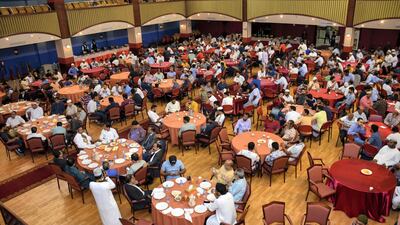Community groups have answered the call to help less fortunate Indian expatriates separated from family and friends during Ramadan.
Iftar gatherings by non-resident Indian communities in the UAE not only offer opportunities to exchange seasonal greetings, but also help unite organisers of benevolent programmes back home.
Bearys Welfare Forum (BWF) Abu Dhabi is one organisation using Iftar effectively to get its message across to the community.
Bearys are a distinct Muslim community from the coastal Indian state of Karnataka, who also speak a language called Beary.
Like several other Indian communities from the west coast, they are among the earliest expatriate communities to reach the UAE in search of trade and employment opportunities.
Aptly, the word Beary means trade - the main occupation of the community.
At a recent Iftar as hundreds of Bearys, both men and women, sat around tables filled with dates, fruits, snacks and juice glasses, waiting eagerly for the Maghreb call –an appeal was launched to help others in India.
“We are planning to hold a mass marriage ceremony in January in Mangalore and your support will go a long way in ensuring its success,” said Mohamed Ali Uchil, the president of the group.
The plan is to help co-ordinate a wedding for 25 couples. Mass marriage is one of the social causes closest to Mr Uchil’s heart.
Established in 2006, his organisation has so far co-ordinated six such programmes, helping more than a hundred Muslim couples into marriage.
Crippling poverty, the practice of ‘dowry’ where grooms demand money from a prospective bride’s parents, and extravagant customs associated with weddings have made a daughter’s marriage a considerable burden for many Beary parents.
“The un-Islamic practice of demanding dowry from girls’ parents prevalent in the Beary community has become a social menace,” Mr Uchil said.
“Unable to fulfil these demands, many parents are not able to marry their daughters off until they become 35 or 40.
“Our campaign against this practice has created some awareness, but we still have a long way to go.
“For a majority of Beary parents finding suitable alliance for their daughters has become a big burden.
“There are also unmarried men who need some financial support to start a family life.
“Our volunteers back home identify the deserving couples and enlist them for the mass marriage.”
_____________________
Read more:
The delights of an Abu Dhabi Ramadan and Eid night market
My Ramadan: Indian expat makes final journey from UAE easier for relatives of deceased
Kanji broth from south India adds unique flavour to Dubai iftar
______________________
Building toilets for families with no access to sanitary facilities is another welfare initiative from the BWF over the past 12 years.
In the absence of toilets, people, especially in rural households, are forced to relieve themselves in the open.
Many suffered health problems because they wait for the nightfall before they answered nature’s call.
“We have built 136 toilets for poor families in the coastal districts of Dakshina Kannada, Udupi and in the neighbouring Kasaragod in Kerala state,” Mr Uchil said.
The organisation is also seeking to bridge barriers with other Indian communities of diverse religious and linguistic backgrounds.
“Iftar is an occasion to foster peace and understanding among different communities,” Mr Uchil said.
“We always invite members from our fellow-Indian communities from the coastal districts such as Abu Dhabi Karnataka Sangha, Saheban Abu Dhabi, representatives from Bunts and Billava associations in the true spirit of harmony and togetherness.
“We also chose tolerance as the theme for this year’s Ramadan lecture.”
The mood of the evening was captured succinctly by scholar Maulvi Sahir Hudaivi, who while delivering his lecture, quoted the Quranic verse that highlighted the values of fraternity and universal brotherhood:
“O mankind! We created you from a single (pair) of a male and a female, and made you into nations and tribes, that ye may know each other (not that ye may despise (each other).
“Verily the most honoured of you in the sight of Allah is (he who is) the most righteous of you.
“And Allah has full knowledge and is well acquainted (with all things)”. (Al-Hujurat 49:13)”

